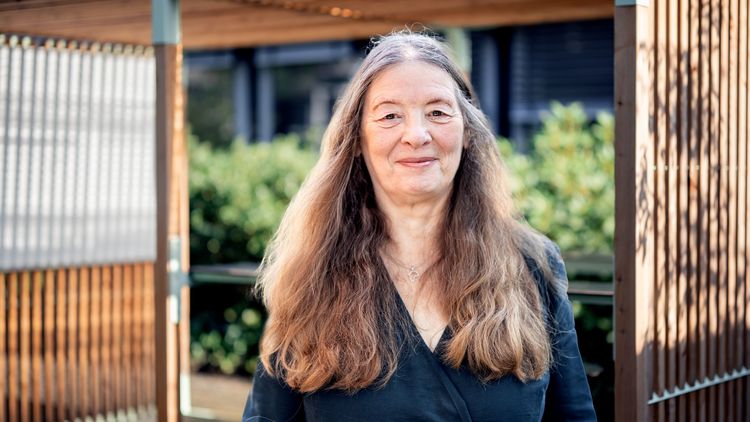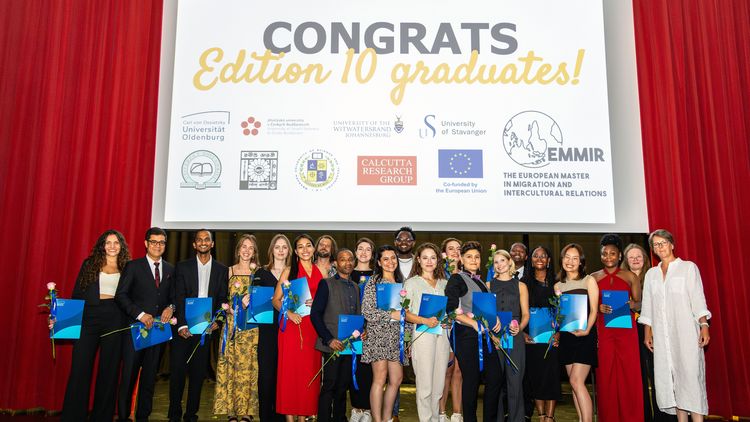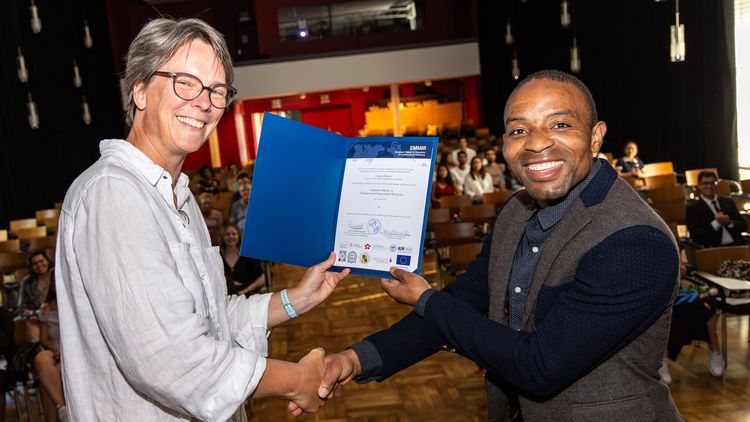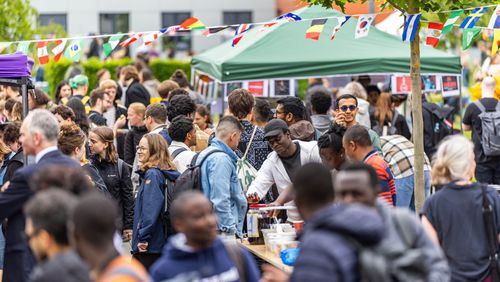Students from all over the world receive comprehensive training in the methodology and theory of migration research and intercultural relations. Over the course of two years they travel to up to five different countries for their studies and required internships and also acquire their own personal experiences of migration. The University of Oldenburg has now bid farewell to the graduates of the 10th Cohort/Edition of the ERASMUS MUNDUS Master in Migration and Intercultural Relations (EMMIR) programme.
EMMIR students traditionally begin and end their unusual study programme in Oldenburg. Political scientist Dr Lydia Potts has been coordinating the African-European-Asian master's programme for the University of Oldenburg since it first began. In this interview she talks about what makes the programme special.
The 27 new graduates from 21 countries bring the total number of EMMIR graduates up to 248. What do you think is the single major insight or experience they all share after completing this course?
Lydia Potts: Well, there really is something one could call the “EMMIR spirit”, which develops from the diversity of the students and teaching staff. A special community forms within a very short space of time. Different cultures, nationalities and specialisations: EMMIR brings together many things, and – this is important – always on an equal footing with everyone involved. This gives students a very multifaceted perspective on the topic of migration.
After the first nine cohorts, the funding was initially discontinued. The European Union twice rejected follow-up applications. Why does the programme still exist despite this?
Potts: EU-funded study programmes always have the goal of becoming independent of support from Brussels, and we, too, tried to achieve this. However, there is a crucial difference with EMMIR: we need the financial support mainly to provide scholarships to students who have no financial resources, and thus enable them to take part. This applies in particular to students from the Global South. Without their participation, the diversity that is so central to EMMIR would be lacking. We are therefore delighted that in the end we were able to convince the EU with what we have to offer. The EU is currently providing funding for four editions until 2027.
The programme brings a very international group to the university every year, and together they explore a city that they had probably never even heard of before. How do the students react to Oldenburg?
Potts: Many of them love Oldenburg, which people on the programme also refer to as O-Town. Cycling is of course one of the main topics of conversation – especially when foreign students see that professors also cycle to university in Oldenburg. They’re sometimes surprised to find that certain things in Oldenburg are quite small, for instance the castle – either because the students themselves come from much larger cities or because they would have expected a European castle to be much larger (she chuckles). That's why there is often a group that tends to gravitate towards the somewhat larger city of Bremen during their stay. But the fact that this year too, 23 of the 27 graduates travelled to Oldenburg to celebrate their graduation certainly says something about their relationship with the city.
EMMIR aims to foster mutual understanding between cultures. At the same time, many new conflicts have flared up around the world in recent years. How does this affect the programme and its students?
Potts: Many of these global conflicts are directly present in the EMMIR editions – after all we have students from countries like Afghanistan, Syria, Ethiopia and Lebanon. Obviously, the conflicts in their home countries take a toll on these students, especially when family members are recruited, displaced, injured or even killed. Some students have also had their own experiences of fleeing their homeland. The different, sometimes very personal perspectives are incorporated into the courses and also discussed outside of seminars and lectures. This means that the participants talk about them and sometimes even argue about them. But because each EMMIR edition grows together into a community, there is always productive dialogue, even on contentious topics. I think this also gives us hope for how conflicts in the wider world can be dealt with.
For 18 months we have had a crisis situation in Sudan. When the war broke out, EMMIR students had to cancel their plans to do internships or spend study periods there. Not long afterwards, our EMMIR partner university in the country was closed down and looted, as were all other educational institutions in Sudan. Most of the teaching staff fled abroad. We are delighted that two representatives from Sudan have now been able to join us in the intensive phase of EMMIR in Oldenburg.
Conversely, the course also has at least a small impact in the world through its graduates. Where are they working today?
Potts: A third of the graduates now work in non-governmental organisations, including Amnesty International, Plan International and World Vision. Almost 30 percent are pursuing an academic career and have started doctoral studies at universities across the globe. A dozen have already completed their doctorates. One of the graduates from the first edition is now a professor in Bangladesh. I think it’s important that the graduates don’t all stay in Europe, but also pursue careers in their home countries and bring the knowledge they have acquired here to those countries.
Seventeen percent of the graduates now work in international organisations such as the European Union or the United Nations (UN) and its sub-organisations. Ten “EMMIRians” now work at the UN's International Organisation for Migration, and not just in Brussels but also in Kenya, Geneva and Turkey. That’s a big success.
One in five graduates works in the private sector, at a public authority or in a government organisation.
What aspect of EMMIR motivates you personally – so much so that you continue to supervise the programme even though you’re supposedly retired?
Potts: In Europe, migration research is very policy-oriented. Funding is provided for research on labour market issues, migration policy and refugee management – and ultimately the question is always what course of action we in Germany or Denmark or France should take now. This means that research is often conducted in a national context. But that’s just one perspective. I believe that the research should not be limited to that context but should also focus on the global issues. EMMIR teaches participants the fundamentals of a type of migration research that is also open to these perspectives – and this is possible because right from the outset the Global North and the Global South, with their very different perspectives, meet as equals in the programme.






